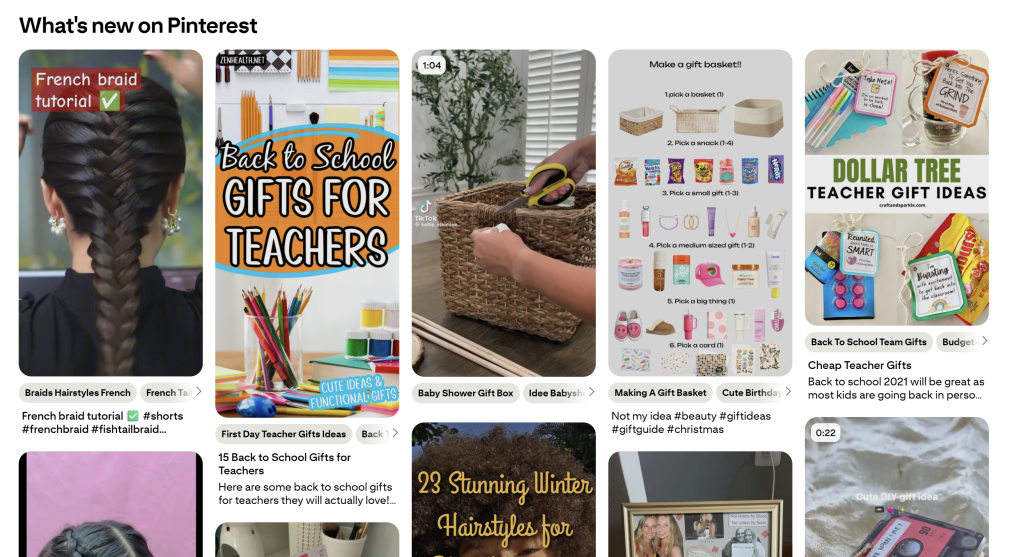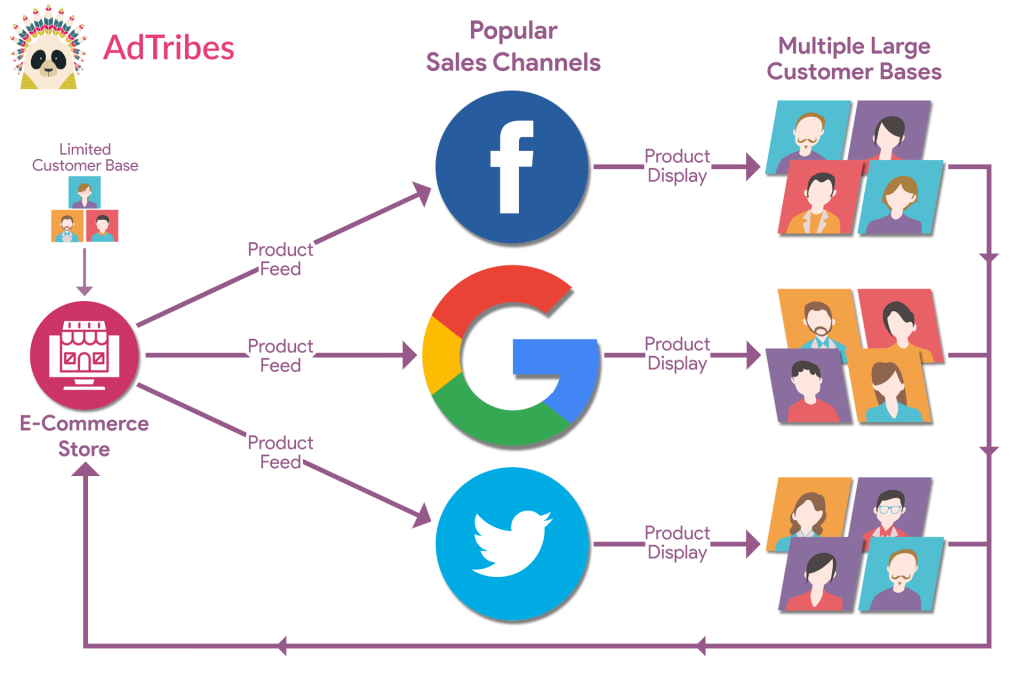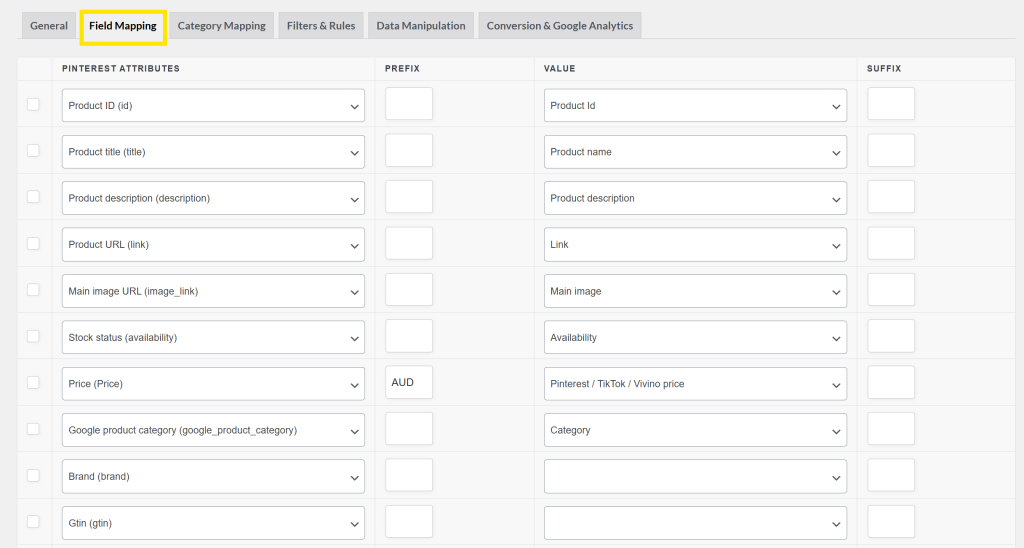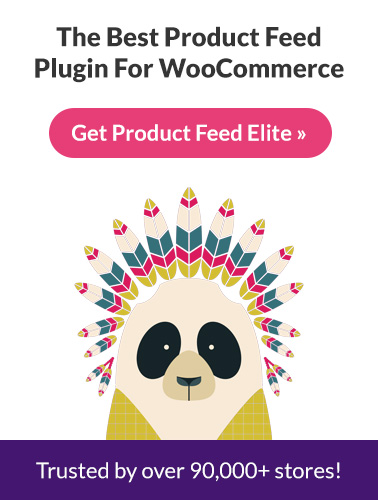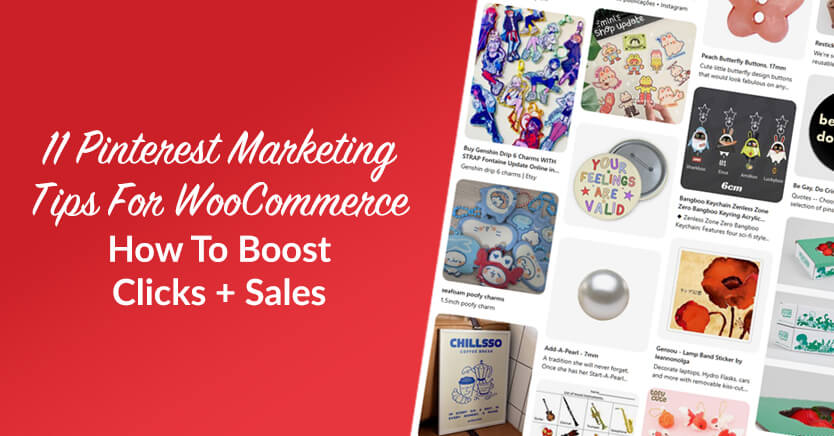
Pinterest marketing tips can help turn product pins into steady traffic and real sales. This platform isn’t just about pretty pictures. It’s a shopping tool in disguise, especially for people planning their next buy.
Pinterest acts like a visual search engine. Users come here with a goal. They aren’t scrolling for fun like on other platforms. They’re often planning outfits, room makeovers, weddings, or holiday gifts.
That makes it perfect for online stores. Products get discovered earlier in the buying process, sometimes weeks or even months ahead. It’s like setting up shop right where shoppers go to dream.
But Pinterest can be tricky. It’s not just about pinning your catalog and waiting. A smart strategy, plus clean product data, makes a big difference. That’s where product feed tools like AdTribes come in. They help sellers create optimized pins at scale without extra effort.
Table Of Contents
- Why Pinterest Matters For Ecommerce
- II. Pinterest Marketing Tips For WooCommerce Stores
- 1. Use high-quality vertical images
- 2. Write clear, keyword-rich pin titles and descriptions
- 3. Set up themed boards for different products or buyers
- 4. Post consistently and at the right times
- 5. Save pins from your own website and from others
- 6. Add Pinterest save buttons to your product pages
- 7. Use seasonal content to ride trends
- 8. Create idea pins to show how products are used
- 9. Repurpose content from Instagram or blog posts
- 10. Check Pinterest Trends for what’s hot
- 11. Claim your website on Pinterest
- III. Feed tricks to boost visibility with AdTribes
- Frequently Asked Questions
- Conclusion
Why Pinterest Matters For Ecommerce
Pinterest isn’t just for mood boards and recipes anymore. It’s now one of the quiet powerhouses behind many online sales.
Typically, people open Pinterest when they’re looking for something to buy, plan, or try. With that in mind, here are the various reasons why Pinterest matters for your WooCommerce business:
1. People come to shop, not scroll
According to studies, Pinterest sends about 33% more traffic to online shops than Facebook, making it a stronger source for referrals.
Pinterest works more like a visual search engine than a feed. For example, users looking for “vintage wedding rings” or “kitchen decor ideas” will type in those exact keywords. This means they already have a goal in mind, and they’re ready to act on it. If your store’s products appear in those searches, you’re meeting potential buyers right when intent is high, and they’re most open to discovering new products.
2. Pinterest traffic lasts longer
A good Pin can keep bringing traffic for months. Unlike social posts that fade after a day or two, Pinterest content sticks around like a helpful note on the fridge. That’s because Pinterest doesn’t rely on a constantly updating social feed, such as Instagram or Facebook.
Evergreen content, like gift ideas, product roundups, or style guides, may continue to show up in search results and boards whenever users look for related topics. As long as your pin is visually appealing and optimized for search, it has the potential to keep performing after you hit publish. That’s great long-term advertising for your WooCommerce store!
3. Boards help organize buying intent
Pinterest boards are a key part of the buying journey. Many users create boards to plan future purchases and specific goals, such as “Home Makeover,” “Wedding Wishlist,” or “Summer Capsule Wardrobe.”
When your products are saved to relevant boards, this signals serious buying intent. For WooCommerce store owners, this is a golden opportunity. You’re technically being bookmarked as a shopper is curating their ideal cart. That’s often the first step in a buyer’s journey, leading to a future checkout.
4. WooCommerce stores already fit the visual style
Pinterest is a visual-first platform. If your WooCommerce store has clean product images, you’re already halfway there.
Big, bright photos with minimal text tend to get shared and clicked more. Think product close-ups, flat lays, or lifestyle photos that feature your product in real life. Most WooCommerce themes are already built with image-forward layouts, making it easy to repurpose existing visuals for Pinterest.
5. Pins show up in Google
Did you know that Pinterest content gets indexed by Google? That means your products can show up in both Pinterest searches and regular web searches. This doubles the chances of your products being discovered and is a huge advantage for smaller ecommerce stores that rely on organic search.
By optimizing your product listing for Pinterest with the right keywords and linking them to product pages, you’re tapping into two traffic sources at once.
6. Pinterest shoppers spend more
According to industry insights, Pinterest users spend 2x more when shopping on Pinterest compared to when they shop on other platforms. That’s because Pinterest attracts planners, not impulse buyers.
Shoppers use Pinterest to curate wishlists, compare options, and visualize their ideal purchase. And so once they’re ready to buy, they’ve done the research and are willing to invest more in the products they actually want. For WooCommerce sellers, this translates into higher-value orders and conversions.
7. It helps you reach people early
As we’ve discovered, most users turn to Pinterest at the planning stage of their buying journey. They’re browsing the platform to gather ideas, plan projects, or get inspired before deciding what and where to buy.
When you show up early, you gain an edge over competitors who may appear later in the decision-making process. By the time a shopper is ready to purchase, your product is already part of their mental shortlist, ready to be revisited.
8. Pinterest trends reveal what’s next
Pinterest regularly publishes insights into rising search trends and consumer behavior. Their annual Pinterest Predicts report gives store owners a glimpse into emerging trends across fashion, beauty, wellness, and so much more. You can also use Pinterest trends to check current trends across industries and locations. Think of it like a forecast for buyer intent.

For store owners, this is a goldmine for planning product launches, seasonal promotions, and targeted Pinterest content. Instead of guessing, you can create Pins that already align with what’s gaining traction.
RELATED READ: Selling On Pinterest: How To Grow Your WooCommerce Store
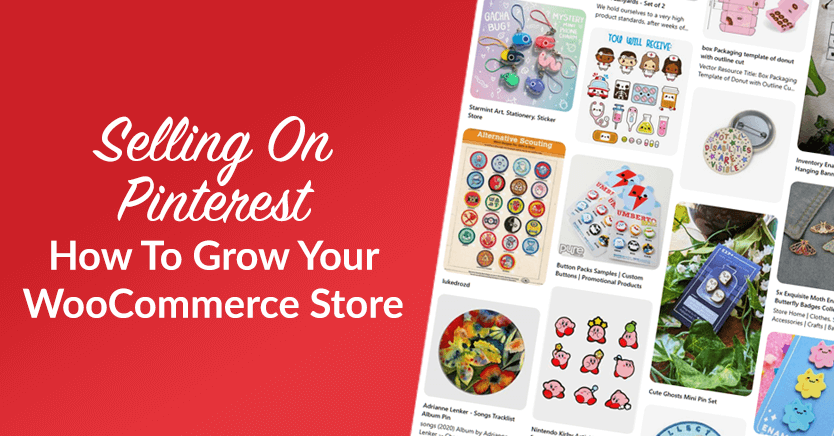
II. Pinterest Marketing Tips For WooCommerce Stores
Pinterest is a visual search engine. That means shoppers don’t just scroll. They search with a goal in mind.
If your WooCommerce store shows up at the right time, with the right images, it can lead to serious clicks and sales. Here are some key Pinterest marketing tips that can help you get started.
1. Use high-quality vertical images
Since Pinterest is a visual platform and tall, high-quality images perform best. The recommended image size is 1000 x 1500 pixels, with an aspect ratio of 2:3. This ensures your pins take up more vertical space in a user’s feed, which makes your Pin more noticeable and clickable.
Image quality plays a huge role too. Make sure to use clear, well-lit photos that showcase your product in action. Lifestyle photos are effective, as they help shoppers visualize how your product can fit in their lives. For instance, instead of showing a mug, you can show it filled with tea on a cozy evening table. These cues make your Pins feel more relatable.
2. Write clear, keyword-rich pin titles and descriptions
Pinterest works like a search engine, so optimizing for keywords is crucial. Make sure that your Pin titles are clear, compelling, and aligned with what your target audience is searching for.
For instance, instead of simply using “Mug,” opt for “Handmade Clay Mug For Gifting” as a product title. In the description, expand on benefits and use cases. Consider adding product names, materials, and ideal occasions (e.g., “perfect for Valentine’s Day”) if they’re commonly searched. These extra details can help improve the overall discoverability of your products.
🎯 POWER TIP: To save time, you can use AI-powered tools like StoreAgent to automatically generate SEO-optimized product titles and descriptions for your WooCommerce store.
3. Set up themed boards for different products or buyers
One of the best Pinterest marketing tips is to organize your content using themed boards. Think of boards like store aisles; each one should have its own theme. Popular fashion brands on Pinterest do this well. Take a look at this example from the jewelry brand Mejuri:
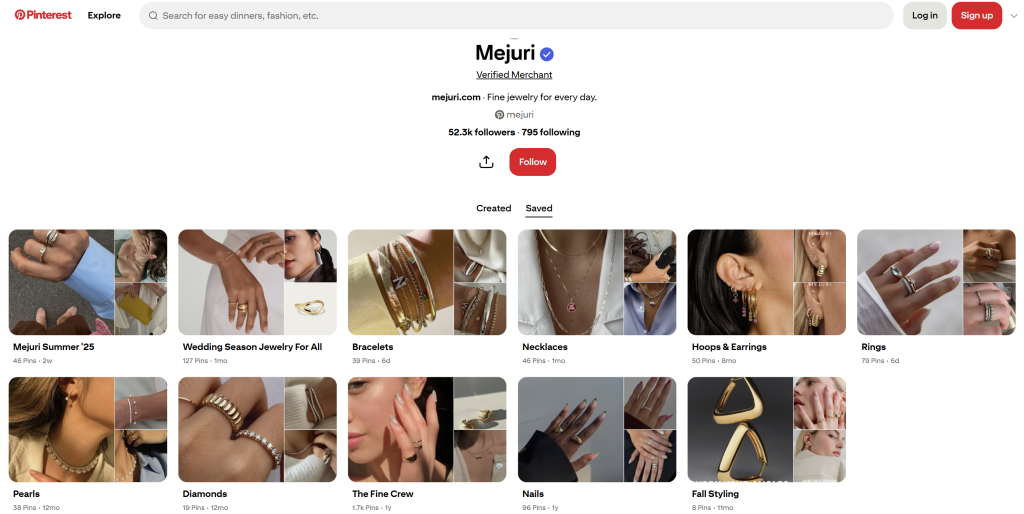
They’ve created specific boards like “Wedding Season Jewelry For All,” “Pearls,” and “Fall Styling”. Each one targets a distinct aesthetic, collection, or customer intention, which makes it easy for browsers to dive into what they’re looking for.
Doing this also helps shoppers. When your products are curated in well-labeled boards, it’s easier to browse, get inspired, and explore your product line.
4. Post consistently and at the right times
Posting consistently signals Pinterest that your account is active and relevant, which can potentially improve your store’s visibility. This platform rewards consistency over volume, so it’s better to pin regularly than to pin multiple products all at once.
Fortunately, you can automate this process by using scheduling tools like Buffer or Tailwind. These tools allow you to plan your Pins ahead of time, which is handy for busy WooCommerce store owners. What’s more, these tools often have built-in analytics, giving you insights on the best times to post based on user engagement.
Feel free to tweak and test your posting time to see what works best for your audience.
5. Save pins from your own website and from others
Here’s one of the most underrated Pinterest marketing tips: mix in complementary content. Pinterest is a community-driven platform, and users value curation. While it can be tempting to pin only your own products, this can look spammy or overly promotional!
Consider mixing in helpful complementary content from other brands, blogs, or creators. If you sell accessories, for instance, you might curate a board that includes outfit inspiration, hair styling tips, or fashion trends. Doing so can help make your profile more helpful and human, while enriching the product discovery experience for potential buyers.
6. Add Pinterest save buttons to your product pages
Make it easier for your customers to save what they like by adding “Save to Pinterest” buttons on your WooCommerce product pages. This allows shoppers to add your products to their personal board, usually as part of their wishlist or future purchase plans. It’s a win for your long-term visibility, as it creates more opportunities for your items to be discovered by others through Pinterest search.
You can add Save buttons to your product pages using plugins like Pinterest for WooCommerce. This strategy can help boost your store’s visibility and make your product pages more Pinterest-friendly.
7. Use seasonal content to ride trends
Pinterest users love planning ahead, and they rely on the platform to gather inspiration and ideas for upcoming seasons, holidays, and life events. If you want to show up when they’re actively searching, start pinning in advance. A good rule of thumb is publishing seasonal product content at least 45 days before the actual event or holiday.
This is where building a seasonal marketing calendar can come in handy. Consider mapping out key retail dates and creating seasonal boards that highlight curated product recommendations for each occasion.
8. Create idea pins to show how products are used
Idea Pins are different from regular product pins. They’re multi-page, interactive pins (like Instagram stories) that let you demo or explain how a product is used without leaving the Pinterest app.
Depending on your niche, you can use Idea Pins to:
- Show how your products are used in real life (e.g., 2-step skincare routine)
- Share product styling tips
- Offer tutorials or behind-the-scenes content
- Inspire use cases (e.g., “Perfect gifts for your bridesmaids”)
Since these pins are engagement-focused, they typically receive more interactions than static posts. They’re also great for building trust, as you can give shoppers a sneak peek into how your products are used in real life.
9. Repurpose content from Instagram or blog posts
You don’t have to start from scratch all the time, especially if you’re already managing a lot of social media platforms for your business. One of the most time-saving Pinterest marketing tips is to repurpose content you’ve already created.
For instance, an Instagram carousel post that walks shoppers through tips on how to use your product can be turned into an Idea pin. This strategy amplifies the reach of the content you already have. Just make sure your repurposed content is vertical, high-quality, and has keyword-rich titles that help with searchability.
10. Check Pinterest Trends for what’s hot
Use the Pinterest Trends tool to gain insights on what’s gaining traction in your niche. This free tool helps you discover rising keywords, searches, and seasonal spikes across different categories like fashion, home, and food. You can also filter by location to get hyper-specific insights.
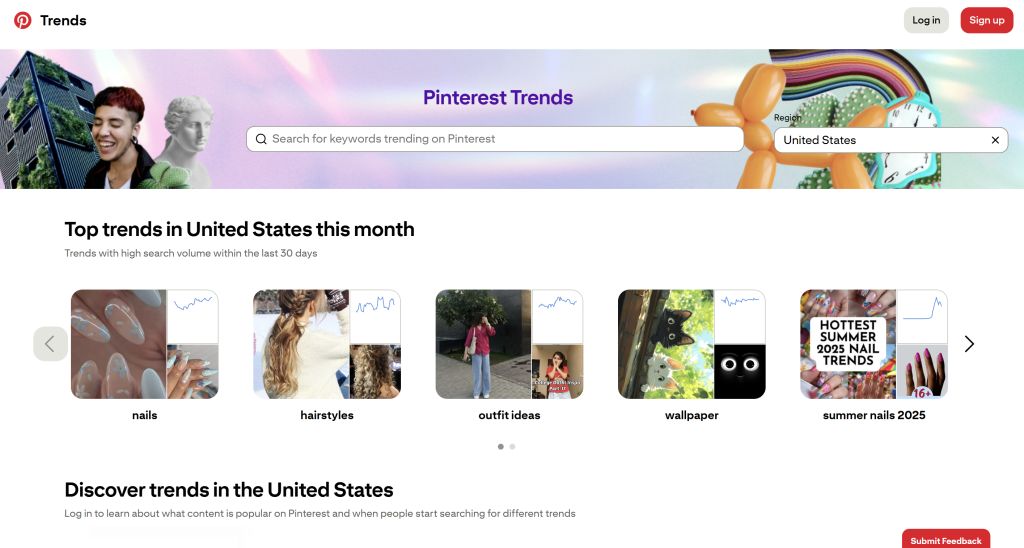
Here are just a few use cases for Pinterest Trends:
- Spot keywords to include in your Pin titles
- Plan seasonal boards around topics people are already searching for
- Time your content calendar more strategically (e.g., when to start posting gift guides)
Aligning your content with what’s trending can increase the likelihood of your products getting discovered.
11. Claim your website on Pinterest
If you haven’t done so already, claiming your WooCommerce website on Pinterest can work wonders for the performance of your store. By claiming your site, you’re verifying that you own the content linked to your Pins. This move unlocks:
- Access to analytics, so you can see how your Pins are performing, what content gets the most saves or clicks, and which products are getting discovered organically.
- Improved trust and branding, since your profile image will appear next to all Pins that link to your site.
- Eligibility for additional features, such as Pinterest Ads and Rich Pins, which allow you to display pricing, stock levels, and other dynamic product info automatically.
To claim your site, you’ll need to add a small snippet of code (meta tag) to your website. You can check Pinterest’s official step-by-step instructions here.
These Pinterest marketing tips we discussed today can help your WooCommerce store show up more, get pinned more, and sell more. Small tweaks can go a long way when shoppers are already looking!
III. Feed tricks to boost visibility with AdTribes
Pinterest marketing tips only go so far if the product feed isn’t set up right. The feed is what tells Pinterest what your products are, how much they cost, and where to find them. Without a clean, accurate feed, your pins might not show up where they should.
That’s where product feed tools come in. For WooCommerce sellers, using a plugin like AdTribes’ Product Feed Pro can make a big difference. It’s like giving Pinterest a better map to your store.
Here are a few ways to improve your feed and get more clicks.
Make sure your product feed is Pinterest-ready
Pinterest uses product data to show pins in search results and shopping tabs. A Pinterest-ready feed includes clear titles, prices, availability, and image links. You’ll also need a working catalog linked to your Pinterest business account.
Use AdTribes to map the right fields
AdTribes lets you match WooCommerce fields to what Pinterest needs.
For example, you can map product types to Pinterest categories or make sure the price shows up correctly. This helps Pinterest understand your catalog better.
Automate updates to keep feeds fresh
Pinterest doesn’t like outdated product info. AdTribes can refresh your feed automatically so it always has the latest stock and price. That way, shoppers won’t see old info when they click through.
Translate feeds if selling across countries
If your store sells in multiple languages, your feed should match. AdTribes works with translation plugins to create language-specific feeds. That means shoppers in Spain see Spanish listings, while shoppers in France see French.
Create custom feeds for seasonal or trending products
Want to promote holiday items or summer gear? You can build a custom feed that includes only certain products. This helps you match what people are searching for during different times of the year.
With the right feed setup, Pinterest can send more of the right people to your store. A well-organized feed is like a clear signpost: it helps shoppers find exactly what they’re looking for.
Use Product Feed Validator to catch errors early
With AdTribes Product Feed Elite, you gain access to the Product Feed Validator that automatically catches feed issues. This tool checks your feed for missing fields, formatting errors, and other red flags that could prevent your products from being accepted or shown properly on platforms like Pinterest.
By validating your feed early, you can resolve problems proactively, saving time, avoiding lost visibility, and ensuring your product listings are always optimized and compliant.
Learn more about this feature here: New Feature! Ensure Error-Free Feeds With Product Feed Validator
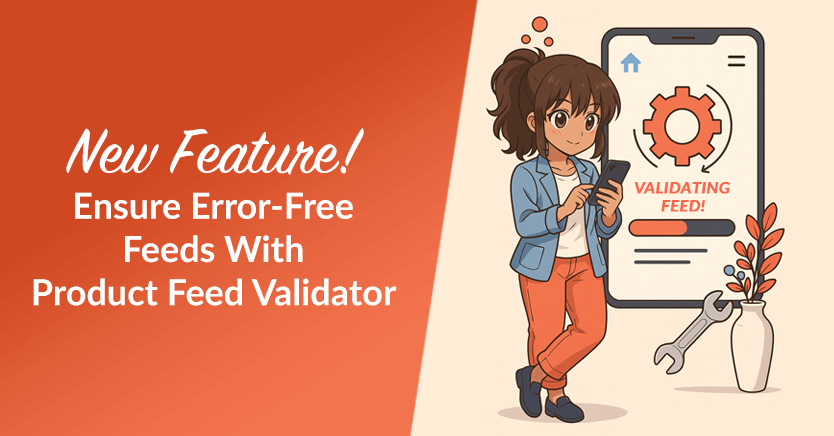
Frequently Asked Questions
How to successfully market on Pinterest?
To market successfully on Pinterest, treat it like a visual search engine. Opt for vertical, high-quality, and keyword-optimized Pins. Make your Pins easy to browse and look for by categorizing them into themed boards, and create seasonal content ahead of time to meet planners in the early stage of their buying journey. To keep your Pins relevant, post consistently and use tools like Pinterest Trends to keep track of emerging keywords and searches. These tips can help improve the visibility of your Pins over time.
For WooCommerce store owners, don’t forget to claim your website and explore feed optimization with tools like AdTribes.
Which product is best to sell on Pinterest?
Lifestyle-focused and visually appealing products tend to perform well on Pinterest. This includes items in categories like beauty, fashion, home decor, kitchen, wellness, and gifting. Products under these niches often lend themselves to planning moments, such as organizing a space, styling an outfit, or prepping for a special occasion, making them highly shareable and searchable.
What kind of content works best on Pinterest?
Content that inspires, teaches, or helps users plan for something tend to perform well on Pinterest. Some examples include styling tips, product comparisons, tutorials, and gift guides. High-performing pins typically tap into meaningful life moments, such as curating a space, planning for a wedding, or preparing for a holiday. To maximize results, make sure your content is visually appealing, keyword-optimized, and tied to a clear purpose.
Conclusion
Pinterest can be a powerful addition to your marketing strategy. This platform lets you meet shoppers early in the buying journey, where they’re actively planning and discovering ideas. With the right strategy, your products can gain traction and visibility on Pinterest.
In this guide, we shared essential Pinterest marketing tips and practical strategies to help you get started. Here’s a quick recap:
- Why Pinterest matters for ecommerce
- Pinterest marketing tips for WooCommerce store owners
- Product feed tips to boost visibility with AdTribes
- Frequently asked questions
If you’re ready to scale your Pinterest strategy even further, tools like AdTribes’ Product Feed for WooCommerce can help streamline your product listings and optimize your feeds. With features like automated updates and custom seasonal feeds, it’s easier than ever to keep your Pinterest catalog fresh, accurate, and discoverable.
Do you have any questions about this topic? Let us know in the comments!
